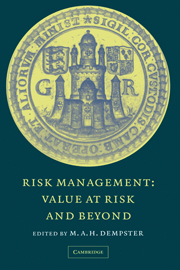Book contents
- Frontmatter
- Contents
- Contributors
- Introduction
- 1 Quantifying the Risks of Trading
- 2 Value at Risk Analysis of a Leveraged Swap
- 3 Stress Testing in a Value at Risk Framework
- 4 Dynamic Portfolio Replication Using Stochastic Programming
- 5 Credit and Interest Rate Risk
- 6 Coherent Measures of Risk
- 7 Correlation and Dependence in Risk Management: Properties and Pitfalls
- 8 Measuring Risk with Extreme Value Theory
- 9 Extremes in Operational Risk Management
Introduction
Published online by Cambridge University Press: 25 January 2010
- Frontmatter
- Contents
- Contributors
- Introduction
- 1 Quantifying the Risks of Trading
- 2 Value at Risk Analysis of a Leveraged Swap
- 3 Stress Testing in a Value at Risk Framework
- 4 Dynamic Portfolio Replication Using Stochastic Programming
- 5 Credit and Interest Rate Risk
- 6 Coherent Measures of Risk
- 7 Correlation and Dependence in Risk Management: Properties and Pitfalls
- 8 Measuring Risk with Extreme Value Theory
- 9 Extremes in Operational Risk Management
Summary
The modern world of global finance had its antecedents in two significant events which occurred approximately thirty years ago: the breakdown of the post-war Bretton Woods system of fixed exchange rates between national currencies and the (re-) introduction of option trading in major financial markets emanating from the creation of the Chicago Board of Trade Options Exchange.
The latter coincided with the Nobel Prize-winning work of Black, Scholes and Merton who produced both a formula for the ‘fair’ valuation of stock options and an idealised prescription for the option seller to maintain a self-financing hedge against losing the premium charged – the famous delta hedge – which involved trading in the underlying stock only. The essence of their argument involved the concept of perfectly replicating the uncertain cash flows of European options. This argument, which required a continually rebalanced portfolio consisting only of the underlying stock and cash, applied more generally to other financial derivatives products whose introduction followed rapidly and at a rate which is still accelerating today. The new concepts were soon applied to futures and forwards and to the burgeoning market in foreign exchange in terms of derivatives written on currency rates, as FX market makers and participants attempted respectively to profit from, and to employ the hedging capabilities of, the new contracts in order to protect cross border cash flows in domestic terms in a world of uncertain exchange rates.
- Type
- Chapter
- Information
- Risk ManagementValue at Risk and Beyond, pp. ix - xivPublisher: Cambridge University PressPrint publication year: 2002



